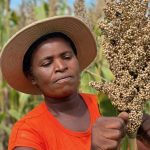Press Statement for International Youth Day 2023 – Green Skills for Youth: Towards a Sustainable World
KAMPALA, 12th August 2023
On this International Youth Day 2023, the AFSA Youth Platform stands united in its commitment to nurturing the potential of young individuals and equipping them with the green skills necessary to forge a sustainable world. The theme for this year, “Green Skills for Youth: Towards a Sustainable World,” resonates deeply with our mission to empower the youth. In this regard, we emphasize the transformative power of Agroecological Entrepreneurship as a pivotal pathway towards achieving environmental stewardship, food security, and economic prosperity.
Understanding Agroecology: A Holistic Approach
Agroecology, which is a science, a practice, and a movement, combines traditional knowledge with modern ecological principles. This synergy is pivotal in fostering a harmonious relationship between agriculture and nature. Agroecology advocates for sustainable and regenerative agricultural practices, emphasizing biodiversity, soil health, and ecosystem resilience. By promoting a deeper understanding of ecological processes, agroecology equips the youth with green skills, empowering them to become stewards of the Earth’s resources.
The Potential of Agroecological Entrepreneurship
Agroecological Entrepreneurship emerges as a dynamic means of translating theoretical knowledge into tangible action. It empowers youth to not only understand ecological systems but also apply these insights to innovative business ventures. Through Agroecological Entrepreneurship, young individuals can cultivate thriving agricultural enterprises that prioritize environmental conservation and community well-being.
Pillars of Agroecological Entrepreneurship:
Holistic Farming Practices: Agroecological Entrepreneurship introduces youth to farming techniques that enhance soil fertility, minimize chemical inputs, and promote crop diversity. By integrating agroforestry, intercropping, and companion planting, young farmers harness the power of natural synergies, reducing the reliance on harmful agrochemicals.
Local and Sustainable Markets: Youth engaged in Agroecological Entrepreneurship are encouraged to establish local and sustainable markets for their produce. This approach not only reduces carbon emissions associated with long-distance transportation but also strengthens community ties and fosters economic resilience.
Innovation and Technology: Agroecological Entrepreneurship encourages the use of innovative technologies that align with ecological principles. From precision farming techniques to utilizing renewable energy sources, youth are at the forefront of integrating technology to drive sustainable agricultural practices.
Knowledge Sharing and Capacity Building: Youth engaged in Agroecological Entrepreneurship are natural catalysts for knowledge dissemination. By actively engaging with local communities, hosting workshops, and participating in farmer networks, young entrepreneurs amplify the impact of green skills, creating a ripple effect of sustainable practices.
The Upsides for Youth in Agroecological Entrepreneurship:
Agroecological Entrepreneurship provides the youth with a comprehensive skill set that goes beyond traditional farming, ingraining attributes of leadership, business management, environmental stewardship, and problem-solving. This approach not only offers youth meaningful avenues for engagement and economic growth, empowering them with a sense of ownership and agency, but also enhances their resilience and adaptability in the face of challenges like climate change and fluctuating global markets. Furthermore, it deepens their connection with the environment, positioning them as crucial guardians of land, water, and biodiversity, ensuring the preservation of ecosystems for current and future generations.
Our Vision for the Future
As we celebrate International Youth Day 2023, the AFSA Youth Platform envisions a world where Agroecological Entrepreneurship flourishes as a cornerstone of sustainable development. By nurturing green skills and fostering a deep appreciation for ecological balance, we empower youth to lead the way towards a greener, more sustainable future. As youth harness their innovative spirit, entrepreneurial drive, and commitment to environmental stewardship, they pave the path towards a world where agriculture thrives in harmony with nature.
Our Collective Demand:
As the representatives of African youth, we urge our governments to:
- A comprehensive shift to agroecology across the entire food system, encompassing sustainable resource management, social empowerment, local value addition, short value chains, and equitable access to healthy and culturally appropriate food. Policymakers must provide robust support and invest in infrastructure to facilitate the wide scale adoption of agroecology, allowing farmers to adapt to climate change challenges while preserving our precious natural resources and biodiversity.
- Increased investment in agroecology to support small-scale farmers, promote sustainable farming methods, and prioritize biodiversity conservation. Furthermore, measures should be implemented to foster agroecological entrepreneurship for young people and create a conducive environment for a resilient and sustainable food system.
- Fair access to land, water, and other vital resources for young farmers and agroecological entrepreneurs. Policies must safeguard the land rights of youth, particularly women, indigenous and marginalized groups, ensuring equal distribution of resources to empower their entrepreneurial endeavors.
- Tailored financial assistance such as grants, and subsidies must be redirected by the Government and development partners to agroecology. This will enable young people to invest in sustainable agricultural practices, innovative technologies, and value addition activities crucial for facilitating access to capital.
- We vehemently call upon an African position against false narratives, including Genetically Modified Organisms (GMOs), Green Revolution agendas, the carbon market, and any other quick fixes.
- We demand fair trade and market access for young farmers and agroecological entrepreneurs. Creating market links, providing storage and processing facilities, and prioritizing local and regional markets are critical. In addition, policymakers should support youth-led cooperatives and fair pricing initiatives for agricultural produce.
- We demand for increased support for young people with the necessary education and skills for agroecological practices, climate change adaptation, and farmer seed management and conservation. This can be achieved by integrating agroecology and environmental education into school curricula and establishing vocational training centers for youth in the agriculture sector.
- We demand the meaningful inclusion of young people’s voices in agriculture, climate change, and food system policy discourse. It is essential to give a seat at the decision-making table, involving young people in policy and program design.
Conclusion:
Improving food systems can be achieved by implementing the critical enablers mentioned above. Youth engagement and leadership are essential to attain food security and good nutrition for all, as they are connected to gender equality, women empowerment, the rural-urban linkage, and innovative practices and technologies. Empowering the next generation of farmers will therefore pave the way for a resilient and sustainable future.

































